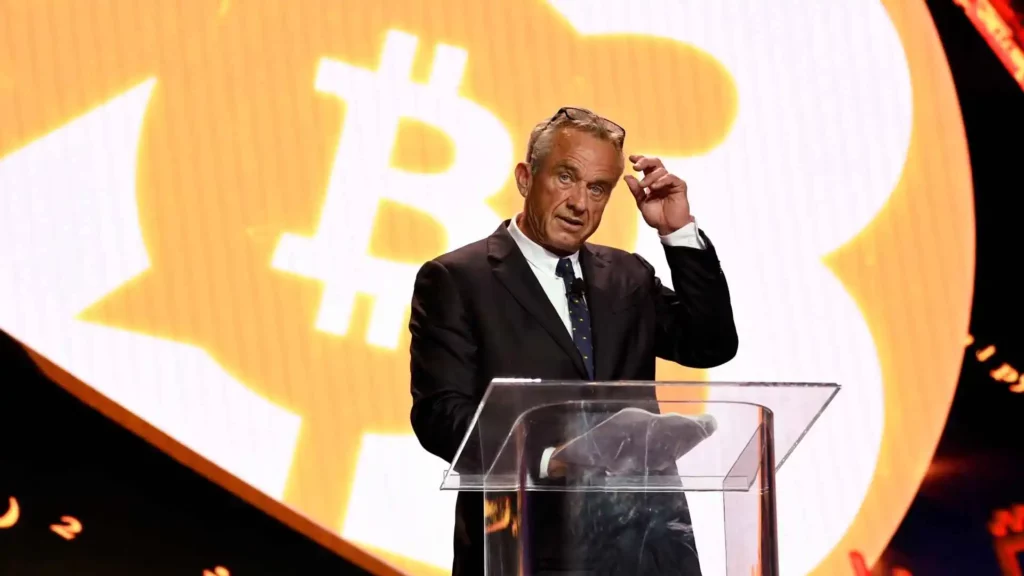Here is Kennedy’s Bold Plan to Integrate Bitcoin in the U.S. Economy
27.07.2024 14:00 1 min. read Alexander Stefanov
At the Bitcoin 2024 conference, Robert F. Kennedy Jr. outlined a bold vision for integrating Bitcoin into the U.S. economy if elected president.
Kennedy’s primary proposal involves daily purchases of Bitcoin to bolster the nation’s financial stability. He suggested reallocating the 204,000 Bitcoin currently held by the Justice Department and U.S. Marshals to the Federal Reserve.
Kennedy views Bitcoin as a key asset that could enhance the U.S.’s global economic position. His plan includes the Treasury Department buying 500 Bitcoin each day until the reserve reaches 4 million BTC, potentially valuing the reserve in the “hundreds of trillions of dollars.”
Additionally, Kennedy proposed making Bitcoin-to-dollar transactions nonreportable and nontaxable to encourage “transactional freedom” akin to free speech. He also wants Bitcoin to qualify for real property exchanges under the 1031 Exchange program to spur economic growth.
Kennedy criticized the current fiat currency system for its role in funding wars, suggesting that a Bitcoin standard could limit such conflicts since Bitcoin cannot be produced at will.
For national security, Kennedy plans to involve Space Force Major Jason Lowery, who advocates for Bitcoin as a “cyber-defense system” and a means of exerting “soft power” on the global stage.
-
1
UniCredit to Launch Structured Product Tied to BlackRock’s Spot Bitcoin ETF
01.07.2025 17:53 1 min. read -
2
Saylor’s Strategy Halts Bitcoin Buying After Historic Accumulation
07.07.2025 17:00 2 min. read -
3
Trump’s Two big Bitcoin Moves: Key Catalysts or Just Noise for BTC Price?
08.07.2025 7:30 2 min. read -
4
Bitcoin Market Stalls as Profit-Taking, Whale Dispersal, and Sideways Action Define the Cycle
01.07.2025 20:00 3 min. read -
5
Speculation Surges as Binance BTC Futures Volume Tops $650 Trillion
04.07.2025 17:37 2 min. read
Public Companies Now hold Over $100 Billion in Bitcoin — 4% of Total Supply
According to new data shared by Bitcoin Magazine Pro, publicly traded companies now collectively hold over 844,822 BTC, valued at more than $100.5 billion, marking a historic milestone for institutional Bitcoin adoption.
Trump Media Holds $2B in Bitcoin as Crypto Plan Expands
Trump Media and Technology Group, the parent company of Truth Social, Truth+, and Truth.Fi, has officially disclosed that it now holds approximately $2 billion in Bitcoin and Bitcoin-related securities.
Strategy Adds 6,220 BTC, Pushing Total Holdings Past 607,000
Michael Saylor’s Strategy has confirmed another major Bitcoin purchase, acquiring 6,220 BTC last week for approximately $739.8 million.
Bitcoin Open Interest Hits $42B as Funding Rates Signal Bullish Overextension
Bitcoin’s derivatives market is heating up, with open interest climbing back to $42 billion while funding rates continue to surge.
-
1
UniCredit to Launch Structured Product Tied to BlackRock’s Spot Bitcoin ETF
01.07.2025 17:53 1 min. read -
2
Saylor’s Strategy Halts Bitcoin Buying After Historic Accumulation
07.07.2025 17:00 2 min. read -
3
Trump’s Two big Bitcoin Moves: Key Catalysts or Just Noise for BTC Price?
08.07.2025 7:30 2 min. read -
4
Bitcoin Market Stalls as Profit-Taking, Whale Dispersal, and Sideways Action Define the Cycle
01.07.2025 20:00 3 min. read -
5
Speculation Surges as Binance BTC Futures Volume Tops $650 Trillion
04.07.2025 17:37 2 min. read


